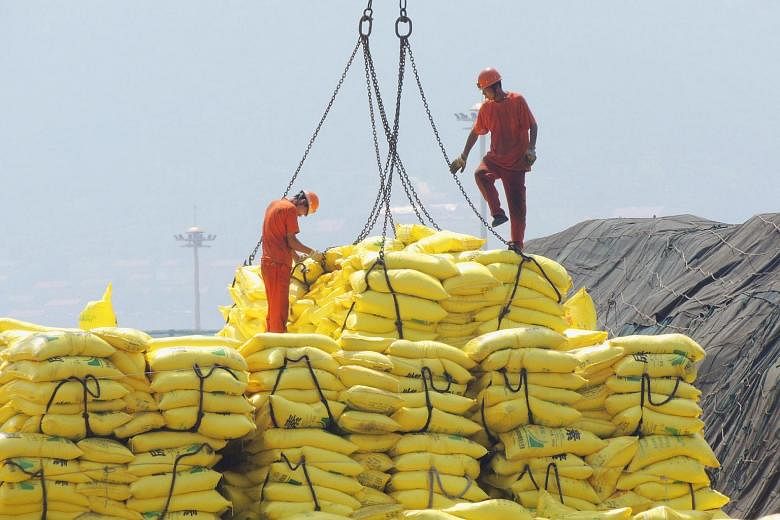BEIJING • China's exports declined more than expected last month, hobbled by a strong yuan and lower demand in the European Union, and adding pressure on Premier Li Keqiang to stabilise growth.
Overseas shipments fell 8.3 per cent from a year earlier in US dollar terms, the Customs administration said - their biggest drop in four months and far worse than expected, reinforcing expectations that Beijing will be forced to roll out more stimulus to support the world's second-largest economy.
The July reading was well below the estimate for a 1.5 per cent fall in a Bloomberg survey and compared with a rise of 2.8 per cent in June.
Imports also fell heavily from a year earlier, dropping 8.1 per cent and widening from a 6.6 per cent decrease in June, leaving a trade surplus of US$43 billion (S$59 billion), below forecasts of US$53.25 billion.
The plunge in imports was in line with market forecasts, but suggested domestic demand might be too feeble to offset the weaker global demand for China's exports.
China's import figure partly reflects weak commodity prices paid to trading partners like Australia, which ships coal and iron ore to China. Volume imports of most major commodities were higher than expected, as Chinese industries took advantage of the lower prices to restock on raw materials.
The July trade data could further dim hopes for an economic turnaround in the second half of this year, after a few signs of stabilisation had emerged in June.
Along with weak domestic investment, subdued global demand is putting China's 2015 growth target of about 7 per cent at risk.
The country's exports to the EU fell 2.5 per cent in the first seven months of this year, from a year earlier, while shipments to Japan dropped 10.5 per cent.
One bright spot was exports to the United States, which expanded 9.3 per cent.
The slump in exports "compounds downward pressure on China's economy and threatens to bring exchange rate depreciation onto the table as a tool to restore competitiveness", Mr Tom Orlik, chief Asia economist at Bloomberg Intelligence, wrote in a research note yesterday.
"Exports are no longer an engine for China growth - no matter what the government does, it's just impossible to see strong export growth as in the past," said Bank of Communications economist Liu Xuezhi. "It means additional slowdown pressure, and it requires the government to be more aggressive in the domestic market."
Mr Liu said China is likely to accelerate infrastructure spending because fixed-asset investment is the "the most immediate and effective" way to stimulate growth.
China's factory activity suffered its biggest contraction in two years in July as new orders fell.
"A recovery in external demand remains far off and economic growth will continue to rely on domestic demand, which implies policies should continue to be relaxed in the second half," wrote Mr Qu Hongbin, China economist at global bank HSBC.
The government has rolled out fresh pro-expansion measures, including special bond sales to finance construction, but has held off weakening the yuan as China seeks reserve- currency status.
Economists also blame a strong yuan for the export weakness, with ANZ Research estimating the currency's nominal effective exchange rate has risen by 13.5 per cent since June last year. Analysts say Beijing has been keeping its yuan strong to wean its economy off low-end export manufacturing.
BLOOMBERG, REUTERS

